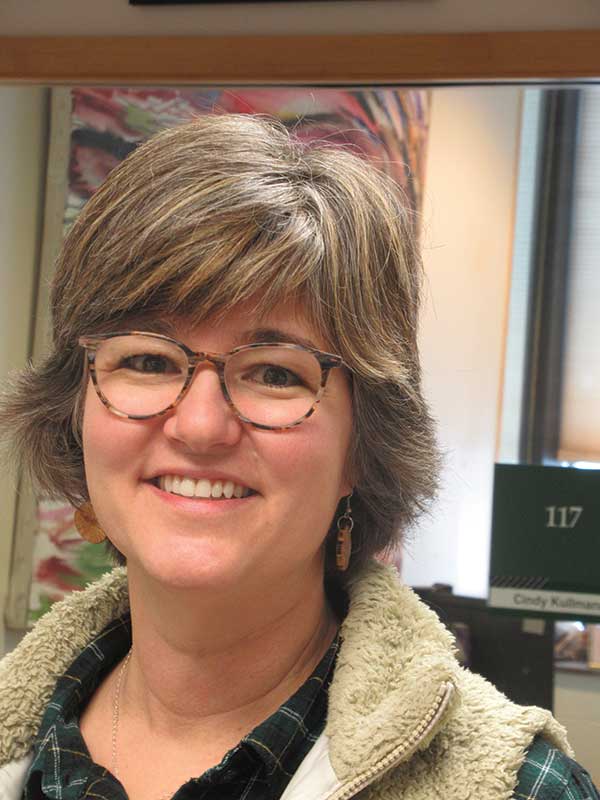She’s got your back
Pam Billings
Pamela Billings is the new coordinator of disability services on the Johnson campus. She worked as a speech pathologist in public schools for years before moving on to academic support in higher education with a brief stint working in a yarn store in between.
“I knew that my background – working with students with disabilities since 1993 – gave me broad experience that I would be able to use here in this position. I have a unique understanding of students’ disabilities having worked for years in public schools, so I understand that relationship,” said Billings in regard to what drew her to a position seemingly so different from her past roles and how that experience has qualified her for her current position.
“My role (now) is to collect the documentation of students who have disabilities and then discuss those disabilities with those students to then come up with some accommodations that will help them be able to access their education. […] It’s kind of like leveling the playing field with students who don’t have a disability.”
She added that her role is important because many students with disabilities wouldn’t be able to level the playing field by themselves in the same way without somebody there whose job it is to advocate for them. “I would say that without this role there would be a population of students on this campus that would not be represented or supported and I feel like they need a person to be able to understand their disabilities so that they are supported,” she said.
Billings stresses the importance of students maintaining good contact with their professors outside of the services offered by her and the rest of the academic services staff.
“My biggest piece of advice for students is the need to communicate with your professors,” she said. “For the most part, the disabilities that students have on campus are hidden, we don’t know necessarily what challenges students are having in their classrooms and the only way that teachers are going to be more understanding or empathetic with students is if the students just communicate with their professors. They don’t have to disclose their disability, but they do need to get to know their professors and have that open communication that will help down the line if there’s ever a time when a student might need to be absent for any reason or need to take advantage of a certain accommodation. And it helps professors understand what students are going through,” said Billings.
As is evidenced by an extensive career working with students with disabilities, Billings is passionate about her work. In her role as coordinator of disability services, however, she has found some aspects of the job especially rewarding, particularly when compared to her past experiences. “I love the relationships that I have with the students and with the faculty. In my previous positions, depending on the position I was in, sometimes I would just evaluate a student and then I never saw them again. In this role I actually get to have relationships with students, check in with them, meet up with them, be able to help them and be able to access their education, which is very rewarding for me,” she said.
While she has lived in Vermont for years, she says that the thing that most drew her to Johnson was the people working on campus. “I had a wonderful interview experience and the people who were interviewing me also said the reason they’ve been here so long is because of the people, which then really led me to want to be a part of that. And since I’ve been here, I’ve met all kinds of wonderful people from all different departments and that’s what led me to want to start what I call the Classic Badger Soccer Club, where on Tuesday afternoons and evenings after work some of us get together outside of our roles. There are people from the president’s office all the way to me and the advising department and professors, and we’re all alike and we’re all playing together and getting to know each other in a different way. I find the people that I’ve met and the students that I’ve met are just so open and kind. We have a lot of fun,” said Billings.
Outside of her work, Billings has a number of hobbies that she finds passion in. “Knitting is my creative outlet; it’s kind of my anti-anxiety medication, if you will, but it’s a great outlet and it’s a great community,” she said. Billings also has two dogs and plays clarinet in the community band in Richmond, VT. She started learning the clarinet in the fifth grade, and has continued playing on-and-off throughout her life. “I’m not very good, but it’s fun,” she says in regard to her clarinet-playing abilities. Billings also loves to travel, and has been to a number of countries outside of North America, including Iceland, Ireland, Scotland, and England. In addition, Billings once raced mountain bikes around New England. Though she didn’t race professionally, she feels that this particular fact might surprise those who have met her.
While she doesn’t anticipate her role changing very much with the July 1 merger into Vermont State University (VTSU), she does see a potential for her to take on more students from other campuses. She intends to work with these students much in the same way as she works with students on the Johnson campus, however, and plans to do so primarily through using resources such as Zoom.



